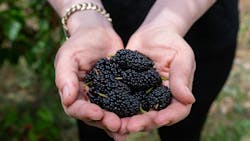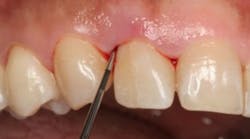Plant-based flavonoid may alleviate periodontitis, according to new data
A new study published in the Archives of Oral Biology suggests a common plant compound called morin may be able to alleviate periodontal inflammation. Results from preliminary trials showed morin had an antimicrobial effect against periodontal pathogens, but the question of whether it can become a ubiquitous remedy for periodontitis remains.1
What is morin?
Morin is a type of flavonoid, which are naturally occurring compounds found in fruits, vegetables, and other plant products such as teas and wines. Morin is primarily derived from mulberries and bilberries and, like many other flavonoids, is known for its antioxidant properties.2
Prior research has shown that the consumption of natural flavonoids may improve overall health due to their anti-inflammatory effects; according to studies cited in Healthline, they may lower high blood pressure, help manage diabetes, decrease a person's risk of developing a heart attack or stroke, and even work as an anticancer drug by preventing cancer cells from multiplying.2
Morin in particular may be helpful in managing and treating inflammatory oral conditions like periodontitis, which affects 50% of the adult population.1 Not only is it the most prevalent disease worldwide, but the leading cause of tooth loss in adults as well-which is why a new way to treat this condition may be a game-changer for both dental providers and their patients.
Researchers from a 2016 study noted that "Morin could have a beneficial effect on several human diseases ... it (morin) exerts antioxidant, antidiabetic, anti-inflammatory, antitumoral, antihypertensive, antibacterial, hypouricemic, and neuroprotective effects, by modulating the activity of many enzymes."3
Helping patients with periodontitis
Results from Oral Biology demonstrated morin's ability to neutralize reactive oxygen species (ROS) and prevent oxidative stress, which is a main component in the development of periodontitis. It also stimulated bone formation and inhibited osteoclast-mediated bone resorption, which "are critical processes in periodontal tissue preservation," according to the study.
Additional antimicrobial and anti-inflammatory effects of morin include:
-
Suppressing pro-inflammatory cytokines
-
Reducing bacterial viability and biofilm of periodontal pathogens
-
Reducing the secretion and gene expression of pro-inflammatory mediators
Researchers are hopeful that a polymer-based slow-release morin formulation can amplify these effects, suggesting it could serve as a nonantibiotic adjunctive therapy in periodontal treatment in the future.
As for right now, dental providers can still help patients suffering from periodontitis. Root planing and scaling can effectively excise plaque below the gumline while dental lasers can remove inflamed gum tissue from the roots of the affected teeth. At-home practices and routines can also help, such as brushing with an electric toothbrush, flossing regularly, using mouth rinses, and forgoing smoking and chewing tobacco.4
Overall, morin-based treatment options may be an effective way to target the microbial and inflammatory aspects of periodontitis as research continues to develop. The latest data shows it can offer a safe, natural, and resistance-free alternative to antibiotics when it comes to periodontitis management.
References
-
Sales LS, Hewitt B, Muchova M, et al. Anti-inflammatory, antioxidant, and antimicrobial evaluation of morin. Arch Oral Biol. 2025;178:106343. doi:10.1016/j.archoralbio.2025.106343
-
Watson K. What are flavonoids? Everything you need to know. Healthline. Updated July 12, 2023. https://www.healthline.com/health/what-are-flavonoids-everything-you-need-to-know
-
Caselli A, Cirri P, Santi A, et al. Morin: a promising natural drug. Curr Med Chem. 2016;23(8):774-91. doi:10.2174/0929867323666160106150821
-
Periodontitis. Mayo Clinic. February 24, 2023. https://www.mayoclinic.org/diseases-conditions/periodontitis/diagnosis-treatment/drc-20354479
About the Author

Sarah Butkovic, MA, BA
Sarah Butkovic, MA, BA, is an Associate Editor at Endeavor Business Media, where she works on creating and editing engaging and informative content for today's leading online dentistry publications. She holds a Master's English Language and Literature from Loyola University Chicago and is passionate about producing high-quality content that educates, inspires, and connects with readers.


